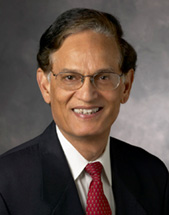Park AFM Luncheon - SEMICON West 2017
![]()
Park Systems returns to SEMICON West in 2017 to exhibit our acclaimed atomic force microscopy solutions tailored for industry research and production applications.
While you visit us on the show floor at the Moscone Center, come by the ThirstyBear Brewing Company on Tuesday, July 11 as we host an Atomic Force Microscopy (AFM) Luncheon featuring talks from special guest speakers: Dr. Sang-il Park, Chairman & CEO of Park Systems and Prof. Krishna Saraswat, Rickey/Nielsen Professor in the School of Engineering at Stanford University.

Dr.Sang-il Park
Chairman & CEO
Park Systems

Prof. Krishna Saraswat
Department of Electrical Engineering
Stanford University
l Event Date and Time : Tuesday, July 11, 2017 — 12:00p to 2:00p
l Venue : ThirstyBear Brewing Company — San Francisco, CA (Map)
l Room: 2nd Floor, El Centro

ThirstyBear Brewing Company
Prof. Saraswat is the Rickey/Nielsen Professor in the School of Engineering at Stanford University. His research currently investigates new device structures to continue scaling MOS transistors, DRAMs and flash memories to the nanometer regime, 3-dimensional ICs with multiple layers of heterogeneous devices, metal and optical interconnections, and high efficiency and low cost solar cells. We look forward to hearing his thoughts on the latest developments in nanoscale devices and interconnects in his talk, "Real Limits to Nanoelectronics: Interconnects and Contacts".
Dr. Park will be on hand to share his vision for the future of AFM technology for industrial nanometrology and the latest technological innovations from Park Systems.
About Dr. Sang-il Park
Dr. Sang-il Park, Founder and CEO of Park Systems, was a graduate student of Applied Physics at Stanford University, working in the very group that invented the AFM. He then founded PSIA, later Park Systems in 2007, and developed the world's first commercial AFM in 1989. After 25 years of continuous growth and product innovation, Park has the longest history of AFM business in the industry. The company now has more than 1,000 of its AFM systems in use in over 30 countries around the world.
About Prof. Krishna Saraswat
Prof. Krishna Saraswat is Rickey/Nielsen Professor in the School of Engineering, Professor of Electrical Engineering and by courtesy Professor of Materials Science & Engineering at Stanford University. He received Ph.D. from Stanford University and B.E. from BITS, Pilani, India. His research interests are in new and innovative materials, structures, and process technology of silicon, germanium and III-V devices and metal and optical interconnects for nanoelectronics, and high efficiency and low cost solar cells. Prof. Saraswat has supervised more than 85 doctoral students, 25 postdoctoral scholars and has authored or co-authored 15 patents and over 750 technical papers, of which 10 have received Best Paper Award. He is a Life Fellow of the IEEE. He received the Thomas Callinan Award from The Electrochemical Society in 2000, the 2004 IEEE Andrew Grove, Inventor Recognition Award from MARCO/FCRP in 2007, the Technovisionary Award from the India Semiconductor Association in 2007 and the Semiconductor Industry Association Researcher of the Year Award in 2012. He is listed by ISI as one of the 250 Highly Cited Authors in his field.
Abstract for "Real Limits to Nanoelectronics: Interconnects and Contacts"
Modern electronics has advanced at a tremendous pace over the course of the last half century primarily due to enhanced performance of MOS transistors due to dimension scaling. Silicon bulk CMOS dominated the microelectronics industry in the past. However, future Si technology is reaching practical and fundamental limits. To go beyond these limits FinFETs have been introduced and novel device structures like surround gate FETs, TunnelFETs, etc. and potentially higher performance material like Ge, III-Vs, carbon nanotubes and 2D materials are being aggressively studied. However, as device scaling continues, parasitic source resistance largely dominated by contact resistance, is beginning to limit the device performance. Historically the method to reduce ρc is by increasing doping density thereby thinning the barrier, thus allowing more tunneling current. This method works well for n-Si and p-Ge which can be doped heavily. However, it is not very practical for n-Ge, p-Si, many III-Vs and 2D materials because of inability to dope them heavily. In this talk we will explore other alternatives to reduce contact resistance, such as, metastable doping, Fermi level de-pinning and band engineered heterostructures.
While novel structures and materials have enhanced the transistor performance, the opposite is true for the interconnects that link these transistors. Looking into the future the relentless scaling paradigm is threatened by the limits of copper/low-k interconnects, including excessive power dissipation, insufficient communication bandwidth, and signal latency for both off-chip and on- chip applications. Many of these obstacles stem from the physical limitations of copper/low-k electrical wires, namely the increase in copper resistivity, as wire dimensions and grain size become comparable to the bulk mean free path of electrons in copper and the dielectric capacitance. Thus, it is imperative to examine alternate interconnect schemes and explore possible advantages of novel potential candidates. This talk will address effects of scaling on the performance of Cu/low-k interconnects, alternate interconnect schemes: carbon nanotubes (CNT), graphene, optical interconnect, three-dimensional (3-D) integration and heterogeneous integration of these technologies on the silicon platform.
About SEMICON West
SEMICON West is the premier annual event for the global microelectronics industry, highlighting the latest innovations, products, processes, and services for the design and manufacture of today's most sophisticated electronics.
SEMICON West showcases innovations across the microelectronics supply chain, from silicon to system and everything in between. From the latest research on the cutting-edge of transistor technology, to solutions breathing new life in legacy fabs, SEMICON West is the place to connect to what's new and what's next in microelectronics.
l Link : http://www.semiconwest.org/
